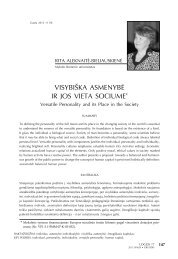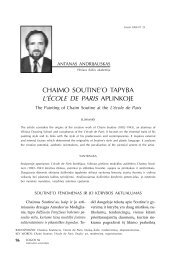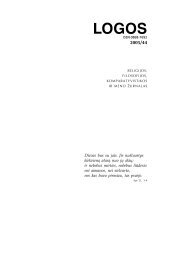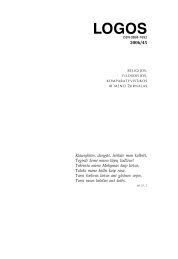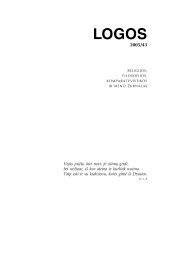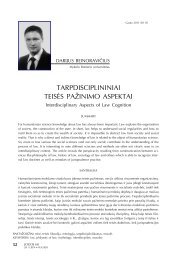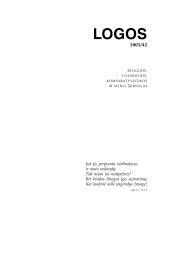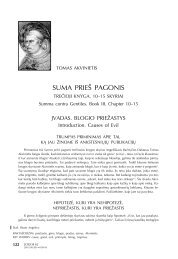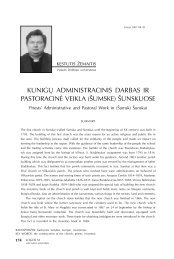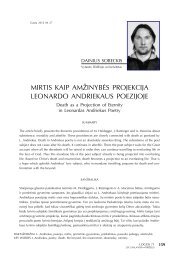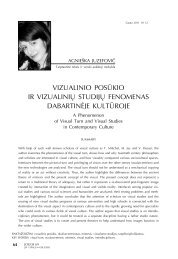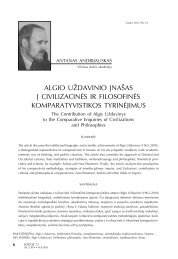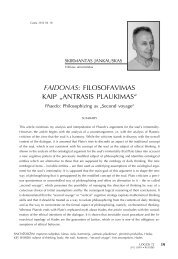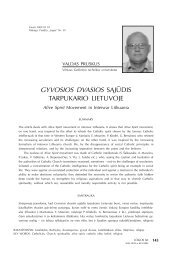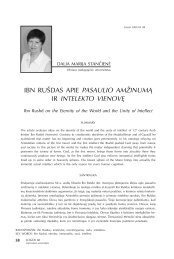Argi papirusas gali augti ten, kur nėra pelkių? Argi nendrės ... - Logos
Argi papirusas gali augti ten, kur nėra pelkių? Argi nendrės ... - Logos
Argi papirusas gali augti ten, kur nėra pelkių? Argi nendrės ... - Logos
You also want an ePaper? Increase the reach of your titles
YUMPU automatically turns print PDFs into web optimized ePapers that Google loves.
Gauta 2002-12-18<br />
Pabaiga. Pradþia „<strong>Logos</strong>“ Nr. 33<br />
JOHNAS F. X. KNASAS<br />
Hiustono Ðv. Tomo universitetas, JAV<br />
MOKSLINË MINTIS<br />
„AR KATALIKØ BAÞNYÈIA MOKO, KAD NËRA<br />
VIENINTELËS TEISINGOS FILOSOFIJOS?“<br />
“Does the Catholic Church Teach that there is<br />
no one True Philosophy?“<br />
SUMMARY<br />
I assess various reasons for the claim that a Catholic should avoid being a proponent of a one and true<br />
philosophy. Rather, within limits, a Catholic philosopher ought to be a conceptual pluralist. These reasons<br />
include Pope John Paul II’s remarks in Fides et Ratio like the following: “The Church has no philosophy<br />
of her own nor does she canonize any one particular philosophy in preference to others.” (para. 49)<br />
Also, Gerald A. McCool in his From Unity to Pluralism: The Internal Evolution of Thomism argues that<br />
ironically the 20th-century Thomistic revival refuted the perceived call of Aeterni Patris to return to the<br />
conceptual formulations of Aquinas. In that respect I consider three “Thomistic” arguments for philosophical<br />
pluralism as put forth by J. M. Le Blond during a famous debate between French Dominicans and Jesuits<br />
following the Second World War. Le Blond’s “Thomistic” arguments include: the abstractive character of<br />
concepts, the equivalency of being and the true; and the epistemology of intellectual dynamism. My<br />
conclusion is that neither the Pope nor Aquinas are proponents of philosophical pluralism.<br />
LE BLONDAS APIE BUVIMO IR TIESOS LYGIAVERTIÐKUMÀ<br />
Antràjá argumentà teorinio pliuralizmo<br />
de jure naudai Le Blondas pradeda<br />
primindamas tai, kad Akvinietis pripaþásta<br />
buvimo ir tiesos lygiavertiðkumà 16 .<br />
RAKTAÞODÞIAI. Tomizmas, bûtis, metafizika, filosofinis pliuralizmas, tiesa.<br />
KEY WORDS. Thomism, being, metaphysics, philosophical pluralism, true.<br />
Taèiau grynasis ir paprastas buvimas<br />
yra tik Dievas, o kûriniams buvimo<br />
trûksta ir jis yra tik Dievo buvimo mëgdþiojimas.<br />
Vadinasi, panaðiai turi bûti ir<br />
LOGOS 34<br />
2003 LIEPA • RUGSËJIS<br />
87



